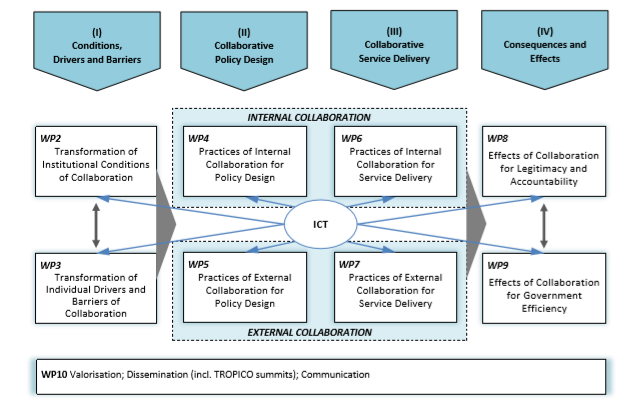WORK PACKAGES
The TROPICO project is organised into 11 work packages (WP). WP1 deals with ethics and data, WP10 with communication and dissemination, and WP11 with management and coordination.
The eight scientific work packages (WP2 to WP9) follow a four-step sequential design (see figure). The first pillar studies the institutional conditions and individual drivers and barriers of collaboration (WP2 and WP3). The second pillar investigates the practices of open and innovative collaboration in and by governments in policy design (WP4 and WP5). The third pillar examines service delivery inside governments and between governments and external actors, such as stakeholders and citizens (WP6 and WP7). The final pillar focuses on the consequences and effects of innovative collaboration based on ICT for legitimacy and accountability as well as government efficiency (WP8 and WP9).

Work Package 2
Transformation of Institutional Conditions of Collaboration
explored the institutional conditions shaping collaboration in and by governments, incl. formal rules and norms embedding administrative traditions and cultures, ‘collaboration trajectories’ (any reform attempts over the past decade), as well as the regulations for data protection and data sharing, and freedom of information as crucial conditions for exploiting ICT in collaboration.
Work Package 3
Transformation of Individual Drivers and Barriers of Collaboration
examined the conditions and practices of innovative collaboration, by investigating the attitudes, skills, knowledge, and incentives for individual actors involved in transforming collaboration, including civil servants, stakeholders, and users. It sought to explain what drives civil servants’ willingness to collaborate with the private sector in a policy delivery setting.
Work Package 4
Practices of Internal Collaboration for Policy Design
studied the emergence and nature of innovative collaboration practices inside governments, examining the actors and means and how they are linked in collaborative policy design. A special emphasis was given to the role of governments and the relevance of ICT in intra-and intergovernmental collaboration.
Work Package 5
Practices of External Collaboration for Policy Design
examined the conditions and practices of external collaboration in policy design, focusing specifically on e-participation platforms, with the aim of contributing to improved understanding of success factors of such initiatives. It analysed information systems but also the challenges stemming from political, administrative, and cultural contexts of online democratic engagement.
Work Package 6
Practices of Internal Collaboration for Service Delivery
studied whether and under which conditions collaborative public management arrangements deliver more innovative public services, focusing particularly on the potential of ICT to manage and overcome the tensions between collaboration in networks and managing single organisations.
Work Package 7
Practices of External Collaboration for Service Delivery
examines whether and under which conditions different types of partnerships result in innovative service delivery and to what extent this is influenced by partnership features (management, leadership and trust), the drivers and level of participation of individual stakeholders and users, and the application of ICT tools to foster collaboration and user involvement.
Work Package 8
Effects of Collaboration for Legitimacy and Accountability
analyses the impact of collaboration on legitimacy and accountability and develops assessment tools to measure those for collaborative governance.
Work Package 9
Effects of Collaboration for Government Efficiency
focuses on the effects and impact of innovative collaborative practices on public sector efficiency, conducting a meta-assessment on red tape and an innovative measurement of efficiency effects of novel collaboration practices.
